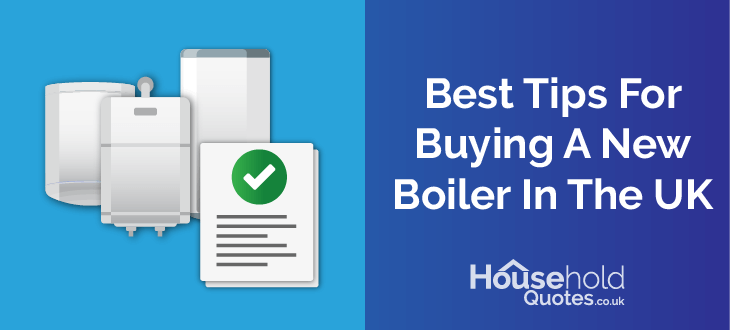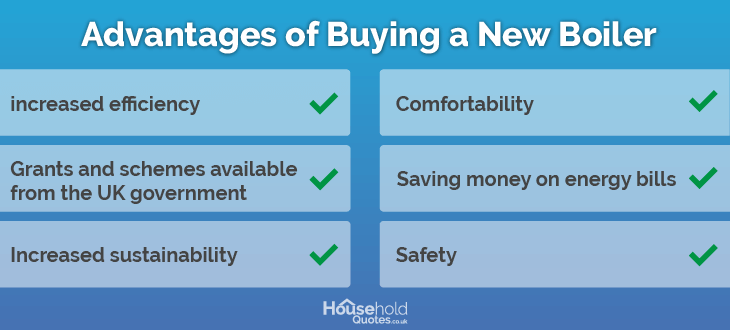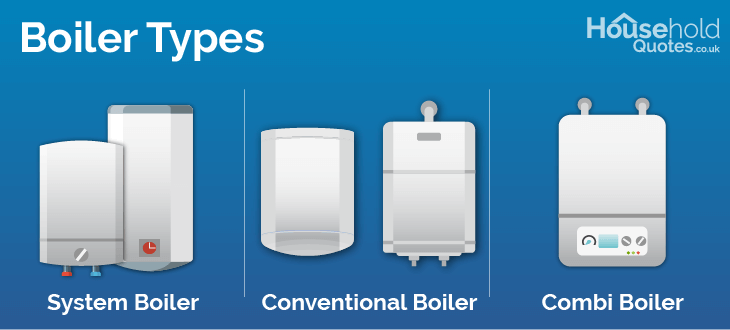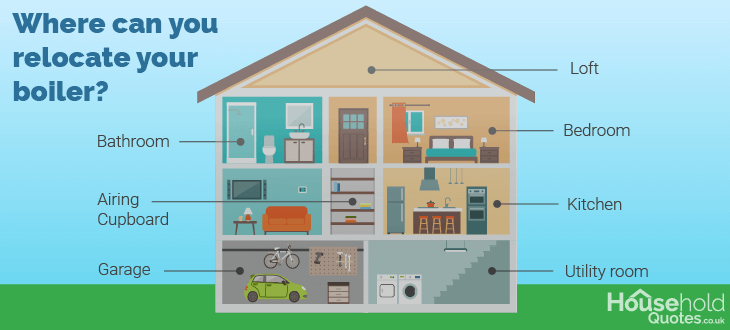Answer these simple questions and we will find you the BEST prices
Which type of solar quotes do you need?
It only takes 30 seconds
100% free with no obligation

Get up to 3 quotes by filling in only 1 quick form

Compare quotes and find yourself the best deal

Increase the value of your home by installing a new boiler
- Householdquotes.co.uk
- Boilers
- Tips for Buying A New Boiler
Best Tips for Buying A New Boiler In The UK 2025


When buying a new boiler, you may find yourself repeatedly questioning how to choose the most suitable option for your specific needs, such as determining the appropriate size, type, or boiler brand.
Throughout this article, we will provide you with a list of tips for buying a new boiler to help you through the daunting process of selecting the right choice for your home, guiding you through aspects such as the different boiler types, sizes, options available and installation placements to support you through the decision-making process.
Before delving into the specific tips that can assist you in making a well-rounded decision regarding the best boiler for your home, it is strongly advised to also seek the guidance of a heating engineer who can evaluate your situation and offer personalised recommendations.
Thankfully, we can help by providing you with up to 3 free and non-obligation quotes from our trusted network of suppliers, ensuring that you get the best deal on the market while also saving precious hours of your time. Simply click the button below to get started.
- Quotes from local installers
- Payment by finance available
- Save up to £975
It only takes 30 seconds

Why buy a new boiler?
Before making a final decision, it is worth noting that several visible signs can be considered to be an accurate indicator that it is the appropriate time to buy a new boiler.
It is widely known that boilers deteriorate with time, becoming a downgrade to the comfortability of your home, and can also potentially pose a risk to your health and safety. Having said this, indicators that your boiler has reached its limit can be seen in its reduced efficiency, the appearance of leaks or the necessity of constant repairs.
It is also worth noting that older boilers, which have become less efficient over time, perform poorly in comparison to their newer counterparts. New boilers have the latest cutting-edge technology, shown by their higher efficiency ratings, translating into saving more money on energy bills and an overall improved performance.
Moreover, the new boiler grants and schemes offered by the UK government to replace your current antiquated boiler with more sustainable options can also be an additional good reason to buy a new boiler, making it much more attractive to invest in light of the initial upfront costs.
With all this being said, there is no doubt that buying a new boiler will be an upgrade to your home, improving efficiency, safety and overall comfortability.
For all of the reasons above, we have compiled an extensive list of tips for buying a new boiler for your home that will help you decide on important aspects such as the type of boiler to choose, its size, fuel and brand.

What type of boiler?
When it comes to choosing a boiler for your home, one of the most important aspects to take into consideration is the type of boiler that will fit your specific needs and expectations.
There are three types of boilers: combi boilers, system boilers, and conventional boilers. Each type presents its own particular set of advantages and disadvantages. For this reason, we will go through each type to make your final decision easier to make.
Combi boilers are the most common type of boiler in the UK thanks to their high efficiency and compact design, which allows them to save up space in comparison to other types of boilers.
They have a high-efficiency rating and can heat water for your central heating and hot running water without any additional components, making them excellent choices for those living in smaller apartments for instance.

On the other hand, system boilers require an additional hot water storage cylinder. This cylinder can store a large supply of hot water and keep it warm enough for distribution throughout the house, allowing it to provide a sufficient amount of hot running water and central heating for larger properties.
Overall, system boilers are a better choice for larger properties with a high demand for hot water, becoming an excellent option for families who live in houses with more than 2 bathrooms, for example.
Last but not least, conventional boilers, also referred to as regular boilers, are the oldest type of boiler. Despite the recent shift towards more modern boiler types, conventional boilers continue to be a preferred choice for households that already have them installed, as this helps reduce central heating costs by eliminating the need to alter the pipework.
In addition, they have a hot water cylinder that provides hot running water to a property and a cold water storage tank to act as their water supply. All in all, these boilers are only worth it to replace an already existing one, which will reduce costs and pipework.
Which boiler brand?
With the different types of boilers clarified, the next step should involve choosing a specific boiler brand for your home.
There are numerous well-established boiler manufacturers in the UK, with each brand having different characteristics. To assist you with boiler advice, we have compiled an extensive guide featuring the most well-known boiler brands in the UK, based on customer satisfaction and reputation.
Some of these manufacturers and their available models include:
Which boiler size?
The next tip for buying a new boiler once you have familiarised yourself with the most popular boiler brands, is to grasp the concept of boiler sizing.
When we talk about boiler size, we are referring to its output capacity rather than its physical dimensions. The size of the boiler your house requires depends on several factors, including the number of bedrooms, bathrooms, and radiators.
Here are some general guidelines for the size of boilers based on the number of bedrooms, radiators, and bathrooms:
| Bedrooms | Radiators | Bathrooms | Recommended size |
|---|---|---|---|
| 1-2 | 0-10 | 1 | 9-27kW |
| 3-4 | 10+ | 2-3 | 18-34kW |
| More than 4 | 20+ | 3+ | 27-43kW |
It's important to choose the right size when buying a new boiler for your home to ensure it meets your heating and hot water needs. Oversized boilers can lead to unnecessary costs, while undersized ones may not meet the demand. Therefore, considering the number of radiators, bathrooms, and the size of your property is crucial in determining the appropriate boiler size.
Moreover, in the event of choosing a boiler, it is highly recommended to seek professional boiler advice to ensure that you opt for the best boiler brand for your specific needs and property type.
Luckily, we can offer invaluable assistance by providing you with up to 3 free and non-obligation quotes from our trusted network of suppliers, so you can gain the necessary insight into what boiler size suits you best without the pain of investing countless hours in extensive research. Get started by simply clicking the button below:
- Quotes from local installers
- Payment by finance available
- Save up to £975
It only takes 30 seconds

Where can you place your boiler?
In addition, location is also an important aspect to consider for choosing a boiler, since this decision can have a great impact on the type of boiler you choose. If you want to hide your boiler in a kitchen cabinet, for example, you will likely need a small combi boiler.

It is also important to consider the location of the boiler to minimise the flue run and avoid additional costs when installing large flue systems for waste gas removal. Any flue fitting must comply with the manufacturer's installation instructions and gas safety regulations.
What is your budget?
When buying a new boiler, it is essential to consider your budget and the various options available. As said previously, combi boilers are one of the most popular types of boilers in the UK, due to their high efficiency and compact design. On top of that, combi boiler prices also rank well, with an average of £500 - £3,000. This makes them one of the cheapest heating systems available.
Boiler prices depend on the brand, type (combi, conventional, or system), and size. Keep in mind that the installation cost will not be included in the price of the boiler itself. Here are some general price ranges for different boiler types:
| Boiler type | Average price excluding installation |
|---|---|
| Combi boilers | £500 - £3,000 |
| System boilers | £580 - £3,500 |
| Conventional boilers | £600 - £3,500 |
These prices cover the cost of new gas boiler installations only. Find out more about oil fired boiler prices by checking out our dedicated page.
As seen above, if budget is among your top priorities in the event of buying a new boiler, conventional and system boiler prices may not be the best option for you. In this regard, combi boilers would be the best choice due to their affordability.
Again, the final cost of a new boiler will depend on numerous factors and the table above is just a general guide. The factors that will affect the final cost will include the complexity of the installation, labour costs, and the location of your house, among others.
What warranty do you want to have on your boiler?
The length of the warranty may impact your decision when buying a new boiler. Boilers can be a significant investment, and you want to make sure that it’s covered should anything go wrong within the first few years of ownership.
Most boilers come with a warranty, but the length of these can vary from two to 12 years, and higher in certain circumstances. The longer the warranty, the better, so do your research to find one that suits you.
Below we've listed the warranty periods you can expect from some of the best boiler brands in the UK, as found across their range of boiler products.
| Manufacturer | Warranty Period |
|---|---|
| ATAG | 10-18 years |
| Ideal | 2-12 years |
| Baxi | 2-10 years |
| Vaillant | 2-10 years |
| Worcester Bosch | 2-12 years |
What qualifications and reviews does your installer need to have?
Making sure your new installer is qualified is essential by law. Not only that, but you could also jeopardise the performance of your boiler across its lifetime by handing over your installation to someone unqualified and unable to do the job properly.
All new gas boiler installations require a Gas Safe registered engineer. This certification qualifies them to carry out all of the work associated with your new boiler installation, including fitting the new boiler, and old boiler removal, and any post-installation service checks and repairs.
You can be sure of your installer's Gas Safe registration by checking various details on their ID card. This contains:
You can use this to check their membership is still in date by checking their membership expiry date.
Remember that each qualification might have a different expiry date so be sure to check that the job they've been called out for is included in their list of qualifications and that their qualification is in date.
This card also includes their licence number. You can enter this number on the company site to get more details of their work history and check customer reviews.
How many quotes do you want to compare?
We recommend that you compare quotes from at least 3 different installers. This gives you a sense of the fairest and most accurate prices for new boiler installations, and then you can find a good deal and save some money.
You should select installers to compare based on their qualifications, work history, and customer reviews. This way, you can choose the most competitive quote from among these options, while being sure that you're not compromising on quality.
Altogether, this process can take several hours, if not days, of careful planning and research. This is obviously not ideal, especially if you need an urgent boiler replacement. To save you all this time and effort, use Household Quotes free quotes comparison service.
We have a whole network of vetted professionals that we can put you in contact with. Simply fill out our 30-second form, and then you'll hear back from up to 3 local boiler installers. You can then compare their tailored quotes and choose the best deal.
It's free, fast, and you're under no obligation to accept any of the quotes you receive. Get started today by clicking the button below.
- Quotes from local installers
- Payment by finance available
- Save up to £975
It only takes 30 seconds

FAQ
You save money on a new boiler installation by comparing quotes from multiple qualified installers to find a good deal.
You should make sure the installer you choose is qualified by checking their ID card. You should also make sure your new boiler is the right size and type for your property.
You will still be able to install a new gas boiler after 2025. The UK government will introduce legislation that means new build homes constructed after 2025 will have to use low carbon heating systems.
When buying a new combi boiler, you should make sure it’s the right size to meet your home’s demands. If you have an especially large home, for example, you might even require a more powerful boiler, like a system boiler.

Alejandro, a copywriter at Household Quotes with a background in law and content creation, is passionate about sustainable and affordable home improvements, and how the EU is adapting its policies to combat climate change.

- Best Tips For Buying A New Boiler In The UK 2025
- Why buy a new boiler?
- What type of boiler?
- Which boiler brand?
- Which boiler size?
- Where can you place your boiler?
- What is your budget?
- What warranty do you want to have on your boiler?
- What qualifications and reviews does your installer need to have?
- How many quotes do you want to compare?
- FAQ
